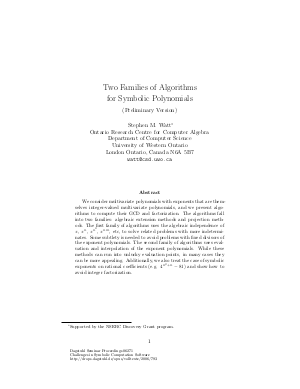Two Families of Algorithms for Symbolic Polynomials
Author Stephen M. Watt
-
Part of:
Volume:
Dagstuhl Seminar Proceedings, Volume 6271
Part of: Series: Dagstuhl Seminar Proceedings (DagSemProc) - License:
 Creative Commons Attribution 4.0 International license
Creative Commons Attribution 4.0 International license
- Publication Date: 2006-11-07
File

PDF
DagSemProc.06271.15.pdf
- Filesize: 221 kB
- 20 pages
Document Identifiers
Subject Classification
Keywords
- Computer algebra
- symbolic computation
- factorization
- gcd
- symbolic exponents
Metrics
- Access Statistics
-
Total Accesses (updated on a weekly basis)
0Document
0Metadata
Abstract
We wish to work with polynomials where the exponents are not known
in advance, such as $x^{2n} - 1$. There are various operations we will
want to be able to do, such as squaring the value to get $x^{4n}-2x^{2n}+1$,
or differentiating it to get $2nx^{2n-1}$. Expressions of this sort
arise frequently in practice, for example in the analysis of algorithms,
and it is very difficult to work with them effectively in current computer
algebra systems.
We consider the case where multivariate polynomials can have exponents
which are themselves integer-valued multivariate polynomials, and we present
algorithms to compute their GCD and factorization. The algorithms fall into
two families: algebraic extension methods and interpolation methods.
The first family of algorithms uses the algebraic independence of $x$, $x^n$,
$x^{n^2}$, $x^{nm}, etc, to solve related problems with more indeterminates.
Some subtlety is needed to avoid problems with fixed divisors of the exponent
polynomials. The second family of algorithms uses evaluation and interpolation
of the exponent polynomials. While these methods can run into unlucky
evaluation points, in many cases they can be more appealing. Additionally,
we also treat the case of symbolic exponents on rational coefficients
(e.g. $4^{n^2+n}-81$) and show how to avoid integer factorization.
Cite As Get BibTex
Stephen M. Watt. Two Families of Algorithms for Symbolic Polynomials. In Challenges in Symbolic Computation Software. Dagstuhl Seminar Proceedings, Volume 6271, pp. 1-20, Schloss Dagstuhl – Leibniz-Zentrum für Informatik (2006)
https://doi.org/10.4230/DagSemProc.06271.15
BibTex
@InProceedings{watt:DagSemProc.06271.15,
author = {Watt, Stephen M.},
title = {{Two Families of Algorithms for Symbolic Polynomials}},
booktitle = {Challenges in Symbolic Computation Software},
pages = {1--20},
series = {Dagstuhl Seminar Proceedings (DagSemProc)},
ISSN = {1862-4405},
year = {2006},
volume = {6271},
editor = {Wolfram Decker and Mike Dewar and Erich Kaltofen and Stephen Watt},
publisher = {Schloss Dagstuhl -- Leibniz-Zentrum f{\"u}r Informatik},
address = {Dagstuhl, Germany},
URL = {https://drops.dagstuhl.de/entities/document/10.4230/DagSemProc.06271.15},
URN = {urn:nbn:de:0030-drops-7933},
doi = {10.4230/DagSemProc.06271.15},
annote = {Keywords: Computer algebra, symbolic computation, factorization, gcd, symbolic exponents}
}
